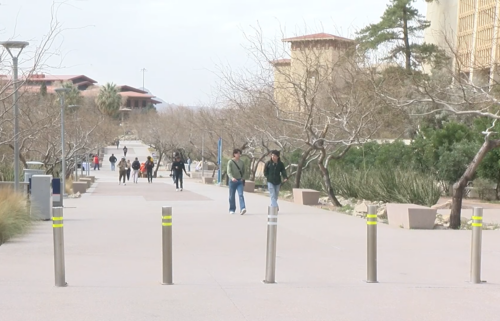A Passage Below: U.S. Border Patrol’s Confined Space Entry Team rescues migrants smuggled into the U.S.
EL PASO, Texas (KVIA) -- U.S. Border Patrol El Paso Sector's Confined Space Entry Team (CSET) was created over two decades ago to combat subterranean human smuggling threats on the border.
They sweep, operate, and supervise the storm drain system which has been used by human smugglers to cross migrants illegally into the United States.
ABC-7 was invited to first see the challenges and risks these agents face while trying to rescue or apprehend migrants nearly 25 feet underground.
One of its team members, Agent Efren Mercado told ABC-7 they've seen an increase in storm drain entries recently.
USBP El Paso Sector's CSET team works under challenging air quality environments, risky paths, and no communication in the storm drains.
"The air quality inside is a big issue. We have monitors that gauge our air quality inside and, just going down some of these they're pretty high so we have to use ropes attached, the ladder rung some of them are broken, there are animals in there," Agent Mercado said.
Oftentimes, these agents find snakes, scorpions, dogs, and cats, among other species.
When it's raining these agents face flash floods which is a problem because they can't operate if it's raining. Someone could get drowned or be dragged by the water current.
This team has to wear special equipment such as helmets, waders, kneepads, elbow pads air quality monitors, etc.
"There are some storm drains and tunnels that are made out of corrugated metal, and they have sharp edges, so we get cut up all the time," Agent Mercado added.
Agents have found tools down in the storm drain used by smugglers to help migrants lead their way at the sewers.
When these migrants try to cross through the sewer system they could face more risks such as injuries, poisoning, and even death.
"When when we enter a tunnel, it has to be a minimum of two entrants just to be safe. And we encounter groups of up to 20, 40 migrants. And it's just two of us down there," Agent Mercado said.
The communication challenge USBP Agents face is that they are not great down there.
They have to have an attendant at the entrance plus a supervisor, and the only communication they have is to get to the migrants, and then have to come back and relay with other agents.
"We don't know what they have on them, or if they're going to fight us. Which thank God it hasn't happened. But, that that's one big challenge," Mercado added.
Agents encounter people who are so fatigued they can't even walk and they've had to drag them out sometimes and strap them onto something and pull them out.
Another challenge Border Patrol agents face not only in the storm drain but across the whole sector is when Transnational Criminal Organizations (TCOs) take advantage of the lack of knowledge of the migrants of the different situations and dangers they can find anywhere.
Most of the time migrants don't know what they are going to be facing while entering inside the storm drains in El Paso.
"How dangerous these situations and those places are. Don't risk yourself looking for the American Dream because it's not really worth it," Agent Claudio Herrera-Baeza said.


